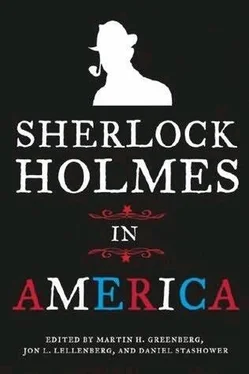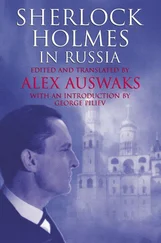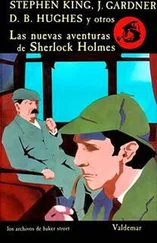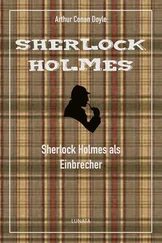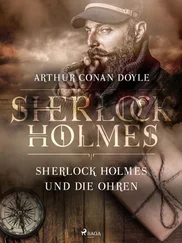“I am sorry you were treated so roughly in Chicago, but we had to be sure. About you and your suitability for… ” She grew pensive for a moment, and then suddenly her eyes widened and her cheeks flushed with anger. “God, how I hate them!” she cried.
Her outburst startled me.
“Hate them for what they did to my father, hate them for what they made him do, hate them for what happened to him.” She threw herself at me like a tigress, pounding her fists against my chest. “I hate them, do you understand! Hate them! And I’ll have my revenge on the whole rotten lot of them before I’m through!”
I could not, of course, account for this sudden, passionate outburst, but as her anger subsided, she collapsed upon my breast, sobbing. She-perhaps at Mycroft’s urging-had pulled me into this underworld, and yet apparently was now denouncing the very people to whom she had betrayed me. How I wished I had Watson to advise me at this moment.
There was nothing for me to do but to put my arms around her; mystified though I was, I was nevertheless still a gentleman. In which embrace the Boss found us moments later.
“Now, Morey, will you look at them lovebirds,” he said to a man standing beside him. “It looks like our little daughter and the old man have gotten mighty fond of each other in a short time. I t’ink you’ve been aced out of the racket. Ha ha!”
The man called Morey turned red. “Damn it, Maddie,” he shouted. “You know how things stand between us.” He tried to push past the Boss, but was blocked by one hairy arm thrown across the doorway.
Miss McParland released herself from my embrace, turned toward them, and addressed Morey: “Listen to me, Charlie,” she said. “I’m not yours now, or ever. I thought I made that perfectly clear. I belong to no man, except the memory of my father, and until I have either his vengeance or his benediction, no man shall ever possess me.” She looked wildly around the room, and then at me. “Oh, God, I am so confused!” she cried, rushing out.
For a moment, there was silence. And the man called Morey (to whom I had taken an instant dislike) muttered, “Dames.”
Now he turned his baleful attention to me. He was a big man, almost as big as the Boss, and from the rippling sinews of his arms, I knew he would be a formidable opponent in combat. “And who might you be?” he barked.
“Jim McKenna,” I replied, and then he hit me. The blow wobbled me, but I stood my ground.
“You sound like an Englishman to me. What’s your name?”
Once again, I said, “Jim McKenna, of Liverpool.” This time two blows followed in quick succession, but I had steeled my midsection and so, while painful, they were resistible.
“I’m only going to ask you one more time, old man,” he said, his voice gleaming with menace, “so you’d better get it right. What’s your name? ”
My promise to Mycroft and my obligation to my country steadied my resolve. As did one other: Miss McParland’s honor. “My name is Jim McKenna of Liverpool and Chicago. If you disbelieve me, then strike me again, but make sure you kill me, for otherwise it will go very hard with you, Morey.”
Morey scoffed as I put up my dukes. As Watson has told you, I was a passably fair boxer in my prime, having battled the great McMurdo, and I had long since taken the measure of Irish bullies from the London underworld, where Moriarty had made ample use of them. He swung once more, but this time I ducked his punch and came up with my right fist just under his chin. Rocked back, he was an easy mark for a left to the solar plexus, and down went Morey in a heap. The great Mendoza himself could not have executed a finer one-two.
The Boss let out a roar of laughter. Morey let out a groan, and then glared at me from the floor. “It’s just you and me now, Jim McKenna,” he said evilly, skulking off.
The Boss brushed his threat aside. “This is war. Ireland needs all her sons, even gorillas like Morey, no matter their land of birth or their personal indispositions toward one another. If a man like your own good self has had his conscience pricked by the indignities heaped upon our most distressful nation, and you wish to join us in our struggle, then… this is where it begins.”
“Then let it begin,” I replied.
In the days, weeks, and months that followed, the Boss and his men did nothing less than to rob me of my Britishness and turn me into an Irishman-or, rather, an Irish-American. I was schooled in the lore of that island, and in its resentful, aggrieved history. I was taught the finer points of counterfeiting, of bomb-making and pistolshooting, loosening my British inhibitions against the straightforward use of violence. At one point, my mind flashed back to that moment in what Watson had called The Adventure of the Three Garridebs , and I realized that never again would I strike a ruthless criminal such as “Killer” Evans with my pistol when I could more easily shoot him in lawful response to his attempted murder of Watson and myself.
As the Boss said, this was war.
I learnt of the Irish underground railroad, which moved fleeing Fenians through Boston, New York, Philadelphia, Buffalo, New Orleans, Chicago, St. Paul, and San Francisco. I realized for the first time the immense amount of money being collected in the States to be remitted to Ireland, apparently to finance a very big operation to be forthcoming. I heard names bruited, names not unfamiliar to me, but never in this context: Casement and Childers and a man they called “Dev.” The thought that men such as these could possibly be traitors to the Crown stunned me.
There was more, even darker. Cut off from civilization as I was, I had little recourse to newspapers. But the ominous wind blowing from east had not gone unnoticed, even in here Buffalo. The possibility of war with the Kaiser’s Germany was now openly being contemplated across the Atlantic and, to judge from the tenor of my companions’ remarks, it was something devoutly to be wished-and they made no secret where their loyalties lay.
As a “cover,” I was sent to work with a motor-car mechanic. Americans were mad for motor cars, and with my natural aptitude for gadgetry, I was soon on a first-name basis with starters, sparking plugs, oil pumps, and the like. To enhance my Americanness, I even began to sport a small, although hideous, goatee beard, which lent me an uncanny resemblance to “Uncle Sam.”
That was by day. In the evenings I often visited with Miss McParland. Why she had betrayed me in Chicago, I still had no idea. She would not respond to any questions on the subject, but instead fixed me with that penetrating gaze I had come to know so well. Once, I dared ask her what was in the letter I had delivered, but her expression was that of a kindly teacher toward an especially dim pupil, and so I dropped the subject for the nonce. Instead, she handed me a “dime novel” about Custer’s Last Stand and asked me to read it aloud.
I had not got ten words into it when she stopped me. “No, no,” she said. “Listen to me, then imitate.” Treating me as an especially dim pupil, forcing me to repeat words, then phrases, then sentences, correcting my pronunciation at every step, as if she were my Svengali and I her Trilby. The object was to change my manner of speaking, to expunge all traces of Britishness in my speech, and to adopt the harsh and unlovely tunes of the American. I made rapid progress.
One evening, exhausted by my labors at the motor-car shop, as I lay smoking, she entered, but this time without a book. Directly, I made to rise, but she held up her hand in that forward way American girls have, and bid me to lie still. She took the bedside chair, and without preamble, she began to sing. It was a curious, melancholy waltz, but with a kind of serenity about it that I found utterly captivating. And her voice… it was of such perfection that the angels themselves must have been sitting at her feet, listening. “Just a song at twilight / when the lights are low / and the flick’ring shadows / softly come and go… ”
Читать дальше
